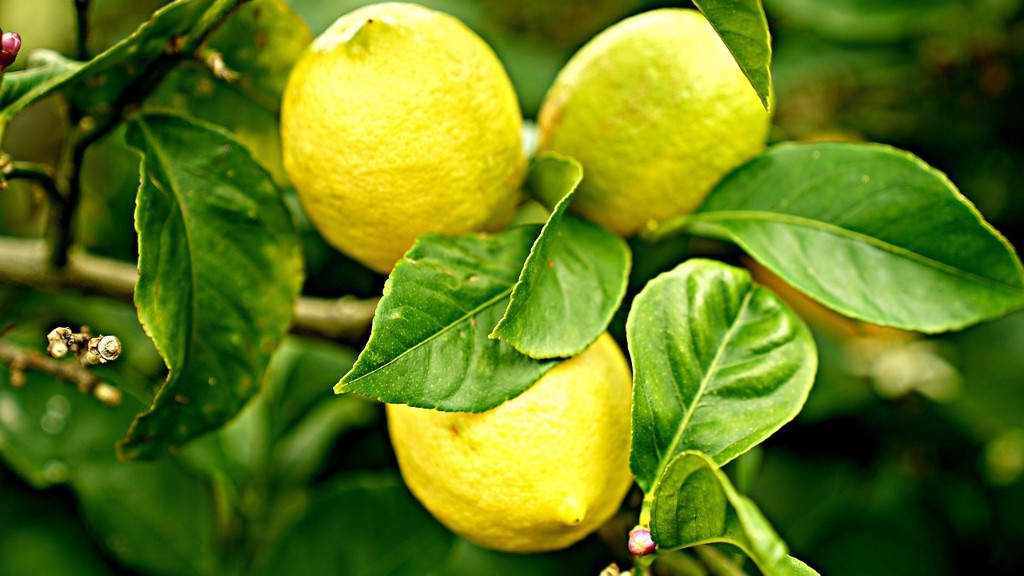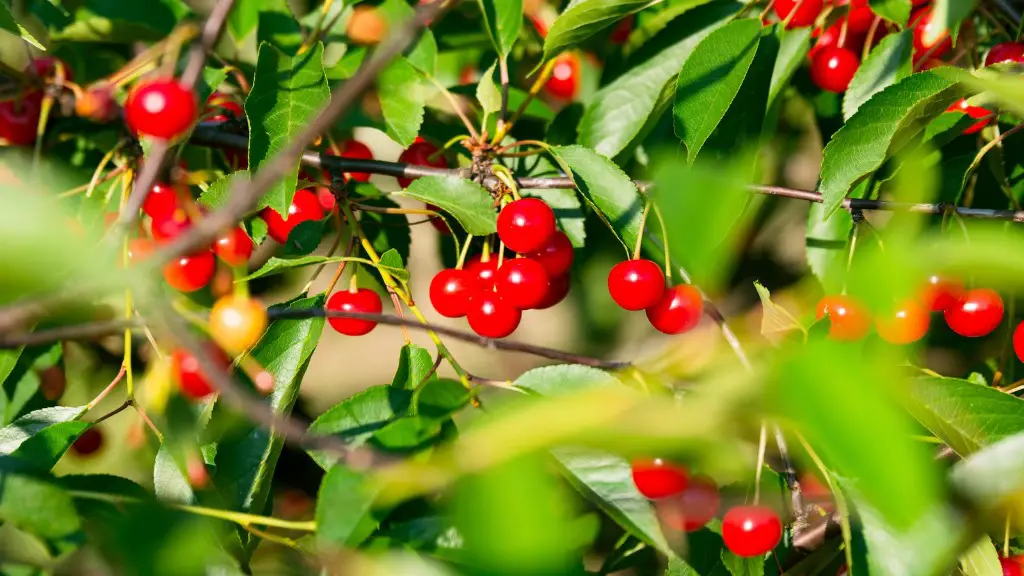Lemon trees are citrus trees that are native to Southeast Asia and certain parts of China, India, and the Middle East. Lemon trees are medium to large in size and produce fragrant flowers as well as fruit. Lemon trees are renowned for their distinctive fruits, which are unusual because they are sour and bitter at the same time. The fruit can be used for culinary purposes, but it also has many other applications, ranging from medicinal to cosmetic. Lemon trees have a long and traditional history, but modern science has also unlocked some of the secrets of their unique traits.
Lemon trees are highly adaptable and hardy, so they are able to grow in a variety of environments, from subtropical to tropical. They can be grown in gardens or even patios, as long as they get several hours of direct sunlight each day. Cold weather can be damaging to the tree, so growers should protect it from frost by planting it in sheltered areas or using Anti Frost Covers. Once a lemon tree is established, it is an easy tree to care for and require minimal maintenance, only needing regular pruning, fertilizing, and watering.
Most lemon trees grow to be between 5 and 6 meters tall, but they can reach heights of 8 meters. The tree has broad leaflets and lancet-shaped leaves that are dark green in color. The flowers are white and fragrant, and the fruit is spherical in shape and ranges in size from ovoid to ovate. The fruit usually has a strong lemon scent and its flesh is juicy and acidic. The fruit is also very high in vitamin C, as well as potassium, phosphorus, zinc, and other minerals.
Lemons are used in a variety of ways in food and medicine. They can be juiced and used in drinks, deserts, or sauces. In medicine, their antiseptic and antifungal properties have been used for both topical and internal treatments. Lemon peel also has health benefits, such as aiding in digestion. Finally, lemon juice is used to preserve food, whiten teeth, remove rust from metals, and can even be used as a natural insect repellent.
Lemon trees have been cultivated for over 2,500 years, but it is only in recent years that scientists have studied them more thoroughly and uncovered the many uses of the fruit. Their adaptability and hardiness are what makes them so popular in gardens and homes, and their vibrant fruit and fragrant flowers make them a highly prized plant. From the kitchen to the garden, lemon trees continue to delight and surprise.
Lemon Tree in Gardening
Lemon trees can be used in various ways in the garden to create a stunning and citrusy aesthetic. Lemon trees are not only fairly easy to care for, they also provide many wonderful fruits that are high in vitamin C and full of flavour. As well as juicing and eating them fresh, the fruits can be used in baking, jam-making, pickles, and even beauty products. Here’s how to get the most out of your lemon tree.
When planting a lemon tree, it’s important to choose an area with plenty of direct sunlight and a soil mix that is acidic and drains well. The tree should be watered regularly, but care should be taken to avoid excessive wetness. Pruning should be done in late winter or early spring to promote growth, but the main purpose of pruning is to shape the tree and create strong branches that can support the weight of the fruit.
Fertilizing your lemon tree is essential to support its growth and encourage health fruit production. Citrus fertilizer should be applied monthly in spring and summer, and more sparingly in the autumn and winter. Applying mulch is also beneficial because it prevents weeds and helps hold in moisture. Finally, be sure to protect the tree from extreme cold weather, such as frost, by covering it in Anti Frost Covers.
Lemon trees make great additions to gardens and balconies and add a cheerful, citrusy ambience. As well as providing wonderful fruits, lemon trees are also attractive to bees, butterflies, and other beneficial insects. So, with the right attention and care, your lemon tree will be blooming in no time.
Medicinal Uses of Lemons
The medicinal properties of lemons have been known for centuries, and it has been used for both topical and internal treatments. Lemon juice contains citric acid, which makes it a natural antiseptic and a potent antibacterial. These properties make lemons beneficial in treating wounds and fighting off bacterial and fungal infections. Lemon juice can also kill many household germs, acting as a natural and effective green cleaner.
Lemons are high in vitamin C which helps support skin health and keep the immune system strong. It also helps the body absorb iron from foods and provides a range of other health benefits. Additionally, lemons can help boost digestion, support heart health, and even reduce inflammation. Lemon juice can also be applied to the skin, which helps tone and lighten pigmentation and reduce the appearance of wrinkles and other signs of ageing.
Lemons are also high in citric acid, which helps break down kidney and gall bladders stones, as well as reduce the risk of new stones forming. Moreover, the citric acid content of lemons helps keep uric acid levels in check, which can lower the risk of gout. Finally, lemons are naturally diuretic and can help improve the body’s Kidney function and promote healthy elimination of toxins.
Lemon juice can be taken internally, topically, or even used as an aromatherapy inhalant. Lemons and lemon juice are generally beneficial for overall health and can provide many benefits for physical and mental wellbeing.
Types of Lemons
The lemon tree is classified as a citrus tree, and as such, has a variety of lemon cultivars. Commonly found lemons in supermarkets include the lemon (Citrus limon) the sweet lime (Citrus limetta) and the mandarin lime (Citrus sinensis). Other less common lemon varieties include the ‘Meyer’, ‘Eureka’, ‘Lisbon’, ‘Lemonade’, ‘Kaffir’, and ‘Ponderosa’.
The fruit of each lemon variety generally differs in colour and size, as well as flavour. For example, the most common variety, the lemon, is usually oval or round in shape and has a yellow skin that is thick, yet smooth. It usually has a tart, acidic flavour and a slightly sweet aroma. The sweet lime, on the other hand, is almost round and has a much thinner skin that is lemon-yellow in colour. It has a distinctively sweet flavour and many people find it easier to eat than the ‘regular’ lemon.
The mandarin lime is also round and has a thin, smooth skin, but this one is fuchsia-pink in colour. It has a tart, yet sweet flavour and some people find it to be a little bit spicier than the other lemons, particularly when eaten raw. Last but not least, ‘Meyer’ lemons are oblong and have a yellow-orange hue. They have a very sweet and aromatic flavour, making them great for desserts or for drinking in beverages.
There are many types of lemons, each of which has its own unique flavour and benefits, so it can be fun to experiment with different ones to find out which ones you like the best. Some lemons also have multiple uses, such as ‘Meyer’ lemons which can be used in both cooking and beverages, while others are best used in specific applications. Either way, lemons provide an abundance of flavour and health benefits.
Lemon Zest
Lemon zest is the outer layer of the lemon’s skin, or peel, and it contains essential oils and other compounds that give a dish and drink its unique flavour. The zest has strong lemon flavour and aroma, making it a popular ingredient in cooking as well as beverages. Lemon zest is also a great source of fibre, pectin, and other minerals, making it a healthful addition to a balanced diet.
To zest a lemon, simply use a zester, grater, or vegetable peeler to get thin strips of the outer skin. If using a zester, it’s best to only use the smaller holes to release the oils, while if using a grater it’s best to use the fine side. After zesting the lemon, it’s important to rinse off any remaining rind particles so that they don’t change the flavour of the dish. Lemon zest can be used in both cooked dishes and drinks, adding a wonderful flavour and fragrance to any recipe.
The essential oils in lemon zest may also provide health benefits. Lemon oil has natural antiseptic, disinfectant, and even aphrodisiac qualities. It can also help improve digestion and is often used to treat headaches and relieve stress. The zest can also help boost the immune system and fight off colds, coughs, flus, and other illnesses.
Lemon zest is a subtle but powerful ingredient that can really add depth and lively flavours to dishes and drinks. Whether added to salads, warm soups, roasts, beverages, or desserts, lemon zest creates a pleasant and refreshing taste. Plus, its health benefits can help boost overall wellbeing.
Lemon Juice
Lemon juice is an incredibly versatile ingredient with numerous uses in the kitchen and beyond. Not only is it a great ingredient in cooking and beverages, but it is a natural disinfectant and cleaner. Lemon juice is also high in citric acid, vitamin C, and other minerals, which is why it is great for health. Here’s what else you need to know about lemon juice.
Lemon juice is tart and is great for adding zing to dishes. It can be used in drink recipes, such as cocktails, lemonade, and tea, as well as in many savoury dishes, such as salad dressings, sauces, curries, and stir-fries. Lemon juice can also be used to marinate meat, to cure fish, or to make a refreshing drink like iced tea. It can also be combined with herbs, spices, and other ingredients to create delicious meals.
Lemon juice has an array of useful applications beyond the kitchen. It can be used to whiten teeth, to remove rust from metals and tarnish from silver, and to deodorize reusable bottles and containers. Fresh lemon juice can also be used as an insect repellent and as a natural fabric softener. It is also great for cleaning surfaces and can be used to make DIY cleaners for surfaces like stainless steel and granite.
Lemon juice has many health benefits too. It can help boost digestion and aid in weight loss. It can also help reduce inflammation, which makes it especially good for those with arthritis or joint pain. Furthermore, lemon juice can help fight off colds, coughs, and other illnesses, due to its vitamin C and antibacterial properties.
From its potent flavour to its medicinal and cleaning applications, lemon juice is truly a marvel. Whether used as a culinary ingredient or a household essential, it can provide numerous benefits. Plus, it has a wonderfully refreshing flavour and aroma that can help to liven up any meal or drink.





